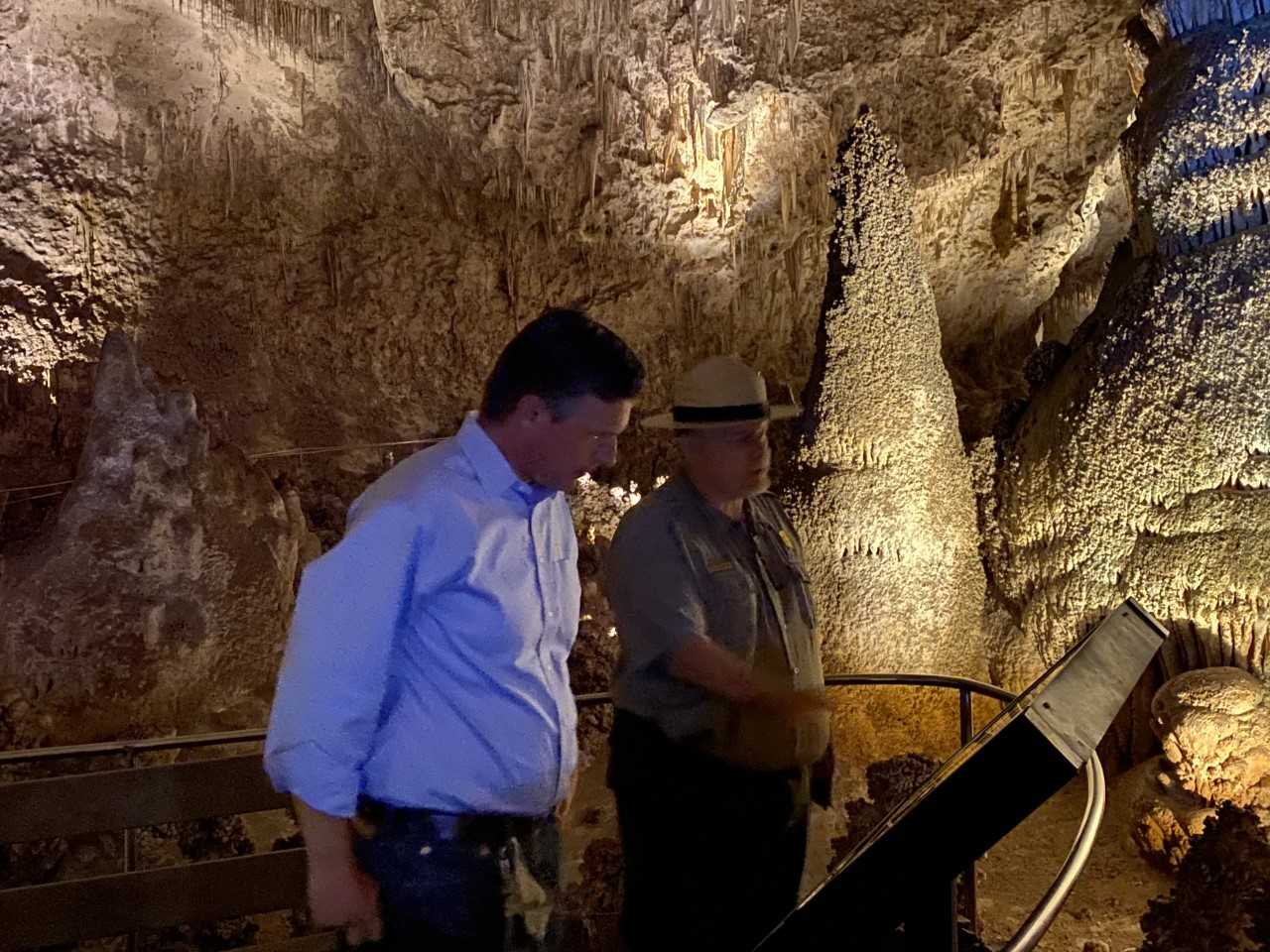Our national parks deserve our investment
Dear Friend,
Our national parks and public lands are incredible places that so many of our families love to visit. But we need to update the infrastructure that supports all those visitors. That’s why I worked so hard to pass the bipartisan Great American Outdoors Act into law last year. This new law will invest $1.9 billion each year to finally fix maintenance projects on our public lands that have been put off for years, or even decades, because they lacked funding.
Yesterday, I visited Carlsbad Caverns National Park to see the progress of the major modernization project to upgrade and replace the elevators that transport most visitors underground. I hope you can take a moment to read and share the article below from the Carlsbad Current-Argus about my visit.

PHOTO: U.S. Senator Martin Heinrich tours Carlsbad Caverns National Park with Superintendent Doug Neighbor, July 6, 2021.
Thanks to the Great American Outdoors Act, Carlsbad Caverns received $40 million in maintenance funding last year—nearly four times more than previous years. This will go a long way toward addressing not just the elevators, but also critical sewer and water upgrades, repairs of historic buildings, and important work on park roads and trails.
I will keep fighting for investments like this that will power a strong economic recovery by putting people to work restoring access and opportunities on all of our public lands.
Sincerely,
MARTIN HEINRICH
United States Senator
U.S. Sen. Martin Heinrich tours Carlsbad Caverns, learns about maintenance projects
Adrian Hedden Carlsbad Current-Argus
U.S. Sen. Martin Heinrich (D-NM) found himself about 700 feet underground to see work both ongoing and needed at Carlsbad Caverns National Park.
During his Tuesday visit, Heinrich toured the park and learned about work proposed and paid for under the Great American Outdoors Act, a bill Heinrich cosponsored which was passed by Congress last year and signed by former-President Donald Trump.
The Act unlocked federal funds from energy development for the National Park Service, providing up to $1.9 billion every year until 2025 to address deferred maintenance on national parks across the country.
At the Caverns, that means completing a rebuild of the secondary elevator system, which is ongoing, and updating and rehabilitating other infrastructure throughout the park.
Throughout the tour, Carlsbad Caverns Park Superintendent Doug Neighbor presented various aspects of the park to Heinrich, including the park’s air monitoring program and the needs of the underground trail.
He also pitched a collection of unfunded but necessary projects to promote safety and an improved experience for park visitors.
These included an $11.8 million project to upgrade utility infrastructure like fencing and power lines, another $225 million to rehabilitate 19 historic structures in the park and $28 million to rebuild the park’s underground trail system where visitors can see the world famous caves.
Heinrich was also briefed on the modernization project of the primary elevators which was completed last year and ongoing work to the park's secondary elevators where structural steel is being replaced.
“It always really bothered me to come to the Caverns and see ancient, disrepaired elevators, to go to White Sands and see bathrooms over a sinkhole,” Heinrich said. “It took a lot of time to build up the capacity to do American Outdoors.
“There was really no big investment in our parks. My hope is that now we’ll have the capacity to really treat these places with the infrastructure they deserve and be able to catch up.”
More money on the way for national parks
Deferred maintenance at the Caverns dates back about 50 years, and it has the largest backlog in New Mexico with work ranging from sewer and water upgrades to maintenance for park roads and trails.
Heinrich was optimistic that in the next five years as the Great American Outdoors Act is active, Carlsbad Caverns and other parks will see stronger infusions of funding than in previous decades.
“I just think other things were pressing at the time, probably,” he said. “We were just able to build a really strong coalition to see this is the time to fix this. You need to take those opportunities whenever they’re available.”
Conservation became key in Heinrich’s tenure in Congress, and he said it takes a balance between industries like oil and gas and stewardship of the most unique locales and natural resources across the U.S.
Heinrich helped push for permanent funding in the Land and Water Conservation Fund which earmarks federal dollars to public conservation projects, while also calling for increased development of hydrogen power in New Mexico and pushing major, utility scale wind and solar developments throughout the state.
Several conservation initiatives succeeded during the Trump administration, Heinrich said, despite what he called its “checkered” history on environmental issues.
“This is a place that needs to be protected,” Heinrich said of the Caverns. “When you come across a place that is as unique as the Caverns, those are places where obviously we shouldn’t be producing energy and there are other places where energy production is the highest and best use.”
This year, Neighbor said Carlsbad Caverns National Park received about $40 million in funds for maintenance, more than the $10 million to $15 million he said it was typically allocated.
Neighbor said he hoped Heinrich’s visit could help inform Congress on the unique needs of the park.
“Many times, there are lots of other perspectives out there. We’re here to speak for the resources,” he said. “Forty million dollars is a lot. We’ve got a lot going on. It’s one thing to hear about Carlsbad Caverns. Now, he (Heinrich) has a new understanding for how special Carlsbad Caverns is.”